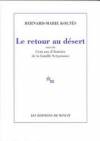Auteurs contemporains
Discours critique sur les œuvres de littérature contemporaine
Outils pour utilisateurs
Outils du site
Le retour au désert
 Bernard-Marie Koltès, Le retour au désert, Paris, Éditions de Minuit, 1988, 87 p.
Bernard-Marie Koltès, Le retour au désert, Paris, Éditions de Minuit, 1988, 87 p.
« Dans une ville de province à l’est de la France, au début des années soixante, Mathilde Serpenoise retrouve la maison familiale qu’elle a quittée quinze ans auparavant. Revenant d’Algérie avec bagages et enfants, elle est violemment accueillie par son frère qui l’accuse de fuir la guerre et de revendiquer son héritage. Une bourgeoisie qui se dispute obstinément comme des paysans qui se souviennent éternellement des conflits de village sans en connaître l’origine et qui connaissent chaque borne de leur terrain malgré les ventes, les hypothèques et les abandons ancestraux. »
(Résumé de Bernard-Marie Koltès.)
Documentation critique
MCCOY, Heather, « Staging the Algerian War : Theatrical responses to the war that dare not speak its name », mémoire de maîtrise, Department of French Studies, Brown University, 2004, 142 f. +++ Thèse de doctorat / mémoire de maîtrise
###Abstract
« This work is a study of the various representations of the Algerian war in French theater from the late 1950’s to the early 1990’s. The playwrights discussed in this work range from well-known, canonical authors, such as Jean-Paul Sartre, Jean Genet and Bernard-Marie Koltès, to lesser-known, contemporary writers such as Eugène Durif, and Yves Laplace. The study begins with an overview of the assigned place of the Algerian war within the context of French Cultural history. There is a particular focus on the cloak of silence that has customarily surrounded the war, and how this has worked to forestall inquiry and discussion of the extent and nature of the war and its aftermath. This is accompanied by an examination of the familiar tropes, discursive commonalities, and metaphors that have been deployed with regard to the Algerian war, and have at times seemed as much a part of the Algerian war, as the actual events themselves. Next there is an analysis of the various ways in which each playwright engages with the war, and the strategies that have been used in its treatment. Significantly, each regards the Algerian war as a foundational moment in French subjectivity and therefore attempts to insert it into his own historical present. Sartre, whose Les sequestrés d’Altonais examined here, explored the devastating effects of the use of torture, not only upon the tortured, but upon the torturers themselves. Genet’s Les paraventsremains one of the most trenchant critiques of Colonialism to appear on any stage, French or otherwise, as it explores the system of abjectification upon which the colonial project necessarily rested. Koltès’ Le retour au desertis a meditation upon origins, return and their impossibility, grounded within the context of a French provincial family as it is coming to grips with the violence of the war. Laplace and Durif both portray the war as an event that has shaped contemporary attitudes pertaining to immigration, integration, and Maghrebians in general. »
La version PDF du mémoire est disponible pour les membres de communautés universitaires qui ont un abonnement institutionnel auprès de UMI - Proquest###
LACHIVER, Morgane, « La satire sociale dans Le retour au désert de Bernard-Marie Koltès », mémoire de maîtrise, département des lettres modernes, Université de Provence, 2001, 95 f. +++ Thèse de doctorat / mémoire de maîtrise
REGAIRAZ, Chantal, « Théâtres de la guerre d’Algérie : Pour des raisons de coeur de Xavier Pommeret, Les paravents de Jean Genet, Djebels de Daniel Lemahieu, Le retour au désert de Bernard-Marie Koltès », mémoire de maîtrise, département des études théâtrales, Universté Paris III - Sorbonne Nouvelle, 1995, 401 f. +++ Thèse de doctorat / mémoire de maîtrise
GIRKINGER, Irene, « Aufstieg und Niedergang der Familie Serpenoise : Bernard-Marie Koltès’ Stück Le retour au désert und der Begleittext ‘Cent ans de l’histoire de la famille Serpenoise’ », dans Eva Katrin MÜLLER, Holger SIEVER et Nicole MAGNUS (dir.), Alterungsprozesse : Reifen-Veralten-Erneuern, Bonn, Romanistischer (Forum Junge Romanistik), 2003, p. 194-202. +++ Chapitre de collectif
MOUNSEF, Donia, « Diasporisation et hybridité dans Le retour au désert de Bernard-Marie Koltès », Esprit Créateur, vol. 41, n° 4 (hiver 2001), p. 37- 46. +++ Article de revue
### Mounsef, 2001, PDF ###
GREWE, Andréa, « Réalité, mythe et utopie dans Le retour au désert de Bernard-Marie Koltès », Cahiers de l’Association Internationale des Études Françaises, vol. 46 (mai 1994), p. 183-201. +++ Article de revue
### Grewe, 1994, PDF ###
BRUN, Catherine, « Le retour au désert : un drame algérien ? », dans Christophe BIDENT, Régis SALADO et Christophe TRIAU (dir.), Voix de Koltès, Paris, Carnets Séguier, 2004, p. 85-106. +++ Chapitre de collectif
KATUSZEWSKI, Pierre, « Le jeu du fantôme dans Le retour au désert », dans Christophe BIDENT, Régis SALADO et Christophe TRIAU (dir.), Voix de Koltès, Paris, Carnets Séguier, 2004, p. 133-148. +++ Chapitre de collectif
BRANCOURT, Vincent, « Comment en finir ? Le statut précaire du récit mythique dans Le retour au désert de Bernard-Marie Koltès », Geibunkenkyu : journal of Arts and Letters, vol. 91, n° 3 (2006), p. 257-289. +++ Article de revue
RUHE, Doris, « Le désert de la ville ou la légende de Romulus et Rémus revisitée. Bernard-Marie Koltès et sa pièce ‘algérienne’ », dans Claudia GRONEMANN et Wilfried PASQUIER (dir.), Scènes des genres au Maghreb. Masculinités, critique queer et espaces du féminin/masculin, Amsterdam, Rodopi, 2013, p. 99-116. +++ Chapitre de collectif
| Le retour au désert (oeuvre) | |
|---|---|
| Titre | Le retour au désert |
| Auteur | Bernard-Marie Koltès |
| Parution | 1988 |
| Tri | retour au désert |
| Afficher | oui |